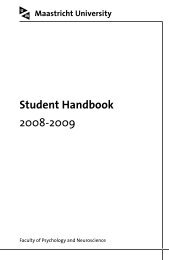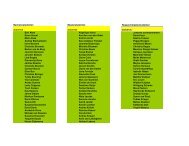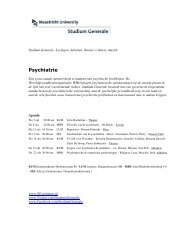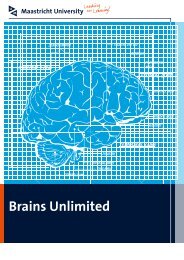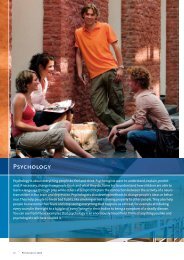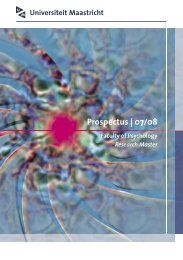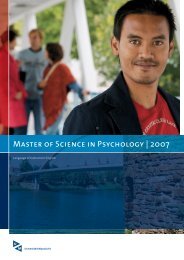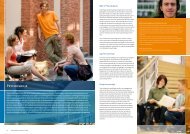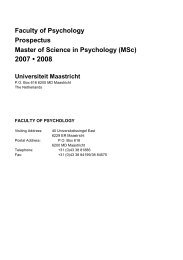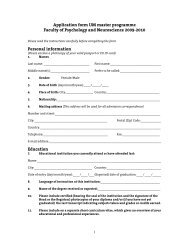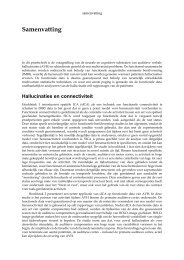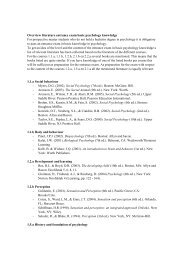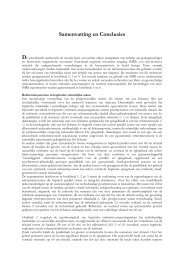Prospectus | 08/09 - Psychology and Neuroscience - Maastricht ...
Prospectus | 08/09 - Psychology and Neuroscience - Maastricht ...
Prospectus | 08/09 - Psychology and Neuroscience - Maastricht ...
You also want an ePaper? Increase the reach of your titles
YUMPU automatically turns print PDFs into web optimized ePapers that Google loves.
<strong>Prospectus</strong> Research Master <strong>Psychology</strong> 20<strong>08</strong> • 20<strong>09</strong><br />
| 480PP Eating Disorders & Addiction – 4 credits<br />
Coordinator: Anita Jansen, Clinical Psychological Science (FPN), Phone 38 81910,<br />
40 Universiteitssingel East, Room 3.731a, E-mail: a.jansen@psychology.unimaas.nl<br />
100<br />
Description of the Course<br />
This course aims to give the student a state-of-the-art overview of current thinking<br />
<strong>and</strong> unresolved issues in research on eating disorders <strong>and</strong> addictive behaviours, with an<br />
emphasis on experimental psychopathology research.<br />
Eating disorders <strong>and</strong> addictive behaviours are among the most prevalent disorders<br />
in adolescents <strong>and</strong> young adults; eating disorders primarily in females <strong>and</strong> addictive<br />
behaviours in males. Eating disorders <strong>and</strong> addictions share some characteristics,<br />
like loss of control <strong>and</strong> craving. For both types of disorders the exact aetiologies are<br />
largely unknown, although it has become evident that a range of factors influence<br />
an individual’s vulnerability to eating disorders <strong>and</strong> addictions (ranging from genetic<br />
to environmental factors). With respect to these vulnerability factors, some may be<br />
specific to one of the disorders, but there may also be more general factors (e.g.,<br />
behavioural disinhibition, impulsivity, sensation seeking) that make an individual more<br />
vulnerable to both eating disorders <strong>and</strong> addictions.<br />
A first aim of this course is to discuss influential theories <strong>and</strong> empirical papers about the<br />
origin or maintenance of eating disorders <strong>and</strong> addictions. Second, special attention will<br />
be paid to experimental psychopathology research methods as an elegant method to<br />
test hypotheses on the origin, maintenance or reduction of these disorders. Third, the gap<br />
with clinical practice is scrutinised. What is the best treatment a patient can get? And<br />
why is it so difficult to implement the evidence-based treatments in clinical practice?<br />
Instructional Approach<br />
The seminar consists of interactive meetings, which consist of lectures, group<br />
discussions, debates <strong>and</strong> student presentations.<br />
Form of Assessment<br />
Contribution to the group discussions <strong>and</strong> debates, writing <strong>and</strong> presentation of 2 short<br />
papers (one scientific, one popular science), writing <strong>and</strong> presenting a review of another<br />
student’s work.<br />
| 479PP Psychopathology <strong>and</strong> the Law – 2 credits<br />
Instructor: Corine de Ruiter, Clinical Psychological Science (FPN), Phone 38 84344,<br />
40 Universiteitssingel East, Room 3.757, E-mail: corine.deruiter@psychology.unimaas.nl<br />
Description of the Course<br />
<strong>Psychology</strong> <strong>and</strong> law are fundamentally different disciplines, which have great impact<br />
on the work of the forensic psychologist. In this seminar, recent research on forensic<br />
psychological issues will be related to actual cases, including video material. Emphasis



